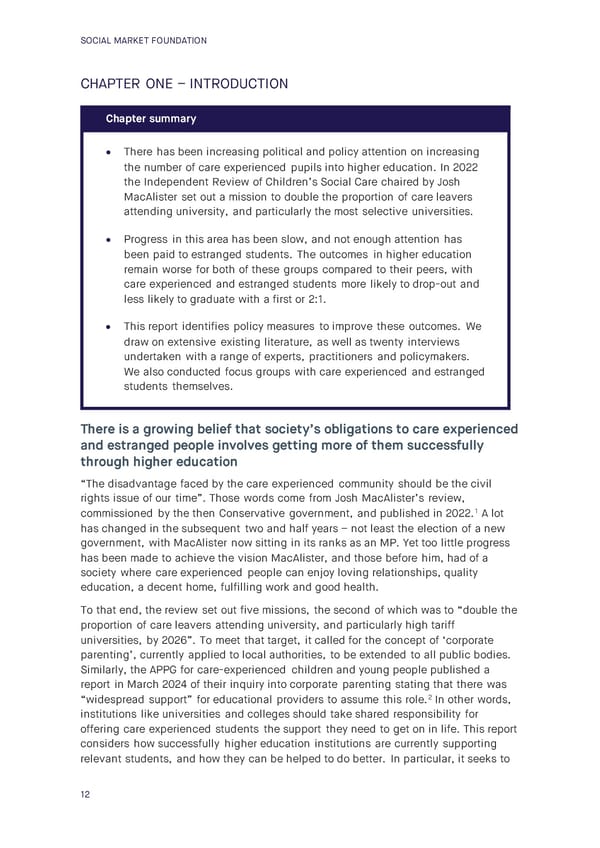SOCIAL MARKET FOUNDATION CHAPTER ONE – INTRODUCTION Chapter summary • There has been increasing political and policy attention on increasing the number of care experienced pupils into higher education. In 2022 the Independent Review of Children’s Social Care chaired by Josh MacAlister set out a mission to double the proportion of care leavers attending university, and particularly the most selective universities. • Progress in this area has been slow, and not enough attention has been paid to estranged students. The outcomes in higher education remain worse for both of these groups compared to their peers, with care experienced and estranged students more likely to drop-out and less likely to graduate with a first or 2:1. • This report identifies policy measures to improve these outcomes. We draw on extensive existing literature, as well as twenty interviews undertaken with a range of experts, practitioners and policymakers. We also conducted focus groups with care experienced and estranged students themselves. There is a growing belief that society’s obligations to care experienced and estranged people involves getting more of them successfully through higher education “The disadvantage faced by the care experienced community should be the civil rights issue of our time”. Those words come from Josh MacAlister’s review, commissioned by the then Conservative government, and published in 2022.1 A lot has changed in the subsequent two and half years – not least the election of a new government, with MacAlister now sitting in its ranks as an MP. Yet too little progress has been made to achieve the vision MacAlister, and those before him, had of a society where care experienced people can enjoy loving relationships, quality education, a decent home, fulfilling work and good health. To that end, the review set out five missions, the second of which was to “double the proportion of care leavers attending university, and particularly high tariff universities, by 2026”. To meet that target, it called for the concept of ‘corporate parenting’, currently applied to local authorities, to be extended to all public bodies. Similarly, the APPG for care-experienced children and young people published a report in March 2024 of their inquiry into corporate parenting stating that there was “widespread support” for educational providers to assume this role.2 In other words, institutions like universities and colleges should take shared responsibility for offering care experienced students the support they need to get on in life. This report considers how successfully higher education institutions are currently supporting relevant students, and how they can be helped to do better. In particular, it seeks to 12
 Care and Learning in Higher Education Page 12 Page 14
Care and Learning in Higher Education Page 12 Page 14